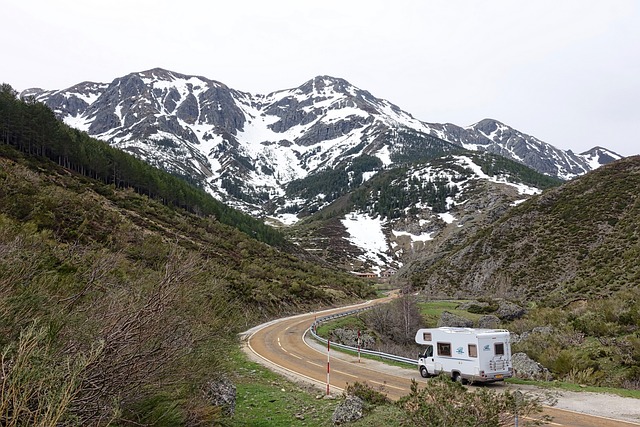Embarking on an RV lifestyle for the first time requires navigating new terminology, understanding various RV types and their suitable uses, and mastering RV maintenance and safety protocols. It's essential to choose an RV that fits your travel needs, whether it's a compact Class B van for ease of driving or a spacious Class A motorhome for larger groups. Learning the lingo through RV Travel Tips blogs, online forums, and glossaries will help demystify the specialized language and empower you to engage with peers and park staff confidently. Maintenance skills are crucial for hassle-free travel, so regular checks and prompt repairs of the vehicle's systems—water, electricity, propane, heating, cooling, and plumbing—are vital. Safety is paramount, and understanding how to hitch properly, manage weight distribution, and stay informed on weather forecasts will ensure a safe journey. Planning ahead for camping destinations using platforms like Recreation.gov or apps like AllStays and RV Parky, and adapting to the RV kitchen's space and resources, are key components of an enjoyable RV trip. Financial planning is also critical, with budgeting for all aspects of travel—from RV purchase to daily expenses, including membership programs and fuel-efficient models—to ensure a sustainable and cost-effective adventure. RV Travel Tips is a valuable resource that can guide you through these aspects and more, ensuring your RV travels are both adventurous and responsible.
Embarking on your first RV adventure can be as exhilarating as it is daunting. To ensure a smooth journey, our comprehensive guide equips you with essential RV travel tips tailored for newcomers. From grasping the lingo to selecting the perfect rig, mastering maintenance, securing campground spots, and savvy meal planning, this article covers all bases. Dive into practical advice on financial considerations and budgeting for extended travel, transforming your RV into a home away from home. Whether you’re a seasoned camper or new to the road less traveled, these resources will help you navigate the challenges of RV life with confidence.
- Understanding RV Lingo and Terminology for Beginners
- Choosing the Right RV for Your Adventures: A Newbie's Guide
- Mastering the Art of RV Maintenance and Safety Essentials
- Navigating Parks and Campgrounds: Securing Your Spot
- Meal Planning and Kitchen Tips for Living in an RV
- Financial Considerations and Budgeting for Long-Term Travel in an RV
Understanding RV Lingo and Terminology for Beginners
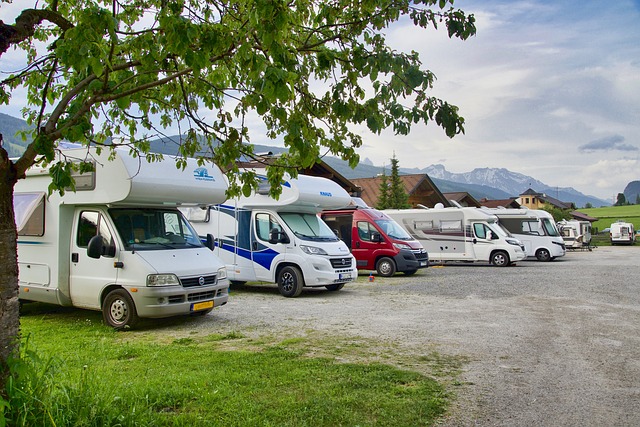
For novice RV travelers, the terminology and jargon specific to RV culture can be a bit daunting. It’s crucial to familiarize yourself with the language used by seasoned RVers to navigate conversations and manuals effectively. Understanding terms like “dry camping,” which refers to RV parking without hookups, or “boondocking,” akin to camping in the wilderness without any services at all, equips you with the knowledge needed for self-sufficient travel. Similarly, knowing the difference between “backing up” into a site and “pull-through” access can save time and reduce stress upon arrival. Resources such as RV Travel Tips blogs, forums, and online glossaries are invaluable for beginners looking to quickly grasp the lingo. Engaging with these resources can demystify the RV experience and empower travelers to communicate confidently with peers and park staff. By mastering the essential RV terminology, you’ll be better prepared to embrace the lifestyle and make the most of your journeys.
Choosing the Right RV for Your Adventures: A Newbie's Guide
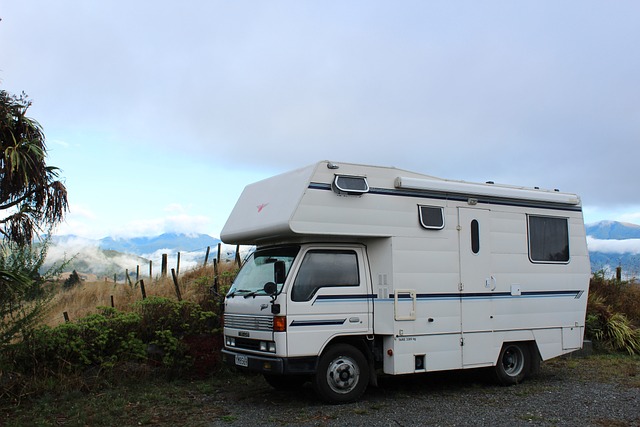
Embarking on your first RV adventure requires careful consideration to ensure a comfortable and enjoyable experience. One of the most critical decisions is selecting an RV that aligns with your travel plans and lifestyle. RV Travel Tips suggest that potential RVers should first assess their needs, including the number of travelers, desired amenities, and storage requirements. For instance, a couple might opt for a compact Class B van if they prioritize ease of handling and maneuverability, while a family or group might prefer the space and features of a Class A motorhome. Additionally, consider the destinations you plan to visit; off-road capabilities may be more important if you’re venturing into less developed areas. Also, think about the balance between self-sufficiency and connectivity. Some RVs come equipped with solar panels and generators for energy independence, while others offer built-in Wi-Fi and smart technology integrations for those who want to stay connected. By researching and understanding the various types of RVs available—ranging from travel trailers to toy haulers—and aligning your choice with your specific needs and preferences, you’ll be well on your way to selecting the right RV for your adventures. Utilize RV Travel Tips as a resource to guide your decision-making process, ensuring that your chosen vehicle will not only accommodate your travel style but also enhance your journey across the open road.
Mastering the Art of RV Maintenance and Safety Essentials
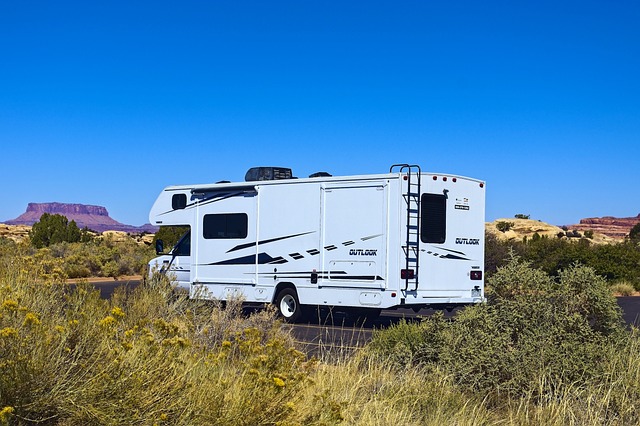
For first-time RV travelers, mastering the art of RV maintenance is pivotal for a smooth journey. Regular upkeep not only prolongs your vehicle’s lifespan but also ensures safety and comfort on the road. Start by familiarizing yourself with the RV’s systems, including water, electricity, propane, heating, cooling, and plumbing. Routine checks and timely fixes prevent minor issues from escalating into major problems. Learn to inspect seals and windows, check tire pressure regularly, and understand your RV’s towing capabilities. Additionally, keep all maintenance records organized for reference and warranty purposes.
Safety is paramount when embarking on an RV adventure. Familiarize yourself with the RV travel tips specific to safety, such as understanding the operation of smoke detectors, carbon monoxide detectors, fire extinguishers, and emergency kits. Practice escape routes and ensure everyone in your traveling party knows how to act in case of an emergency. Educate yourself on proper hitching techniques and be aware of weight distribution to avoid accidents. Stay informed about local weather conditions and plan accordingly to avoid dangerous situations. By prioritizing maintenance and safety, RV travelers can confidently navigate their journey with peace of mind, making their RV travels not just an adventure but a responsible and enjoyable experience.
Navigating Parks and Campgrounds: Securing Your Spot

For first-time RV travelers, navigating parks and campgrounds can be a delightful adventure or an overwhelming challenge. To secure your spot effectively, it’s crucial to plan ahead and understand the various types of camping destinations available. Public lands managed by the National Park Service and U.S. Forest Service often require reservations, especially during peak seasons. RV Travel Tips suggest utilizing platforms like Recreation.gov to book campsites well in advance, as these sites can fill up quickly. Additionally, private campgrounds and RV parks offer a range of amenities and services tailored to RVers. Apps like AllStays and RV Parky can help locate suitable spots and filter them based on your specific needs, such as full hook-ups, Wi-Fi availability, or pet-friendliness. Always cross-reference the availability of these resources with recent user reviews for an accurate preview of what to expect. By being proactive and utilizing the plethora of online resources, first-time RV travelers can confidently secure their camping spots and ensure a smooth and enjoyable journey. With a bit of preparation and the right tools at your disposal, the process of finding and reserving an RV site becomes less daunting and more like one of the exciting RV travel tips for newbies to follow on their trip.
Meal Planning and Kitchen Tips for Living in an RV
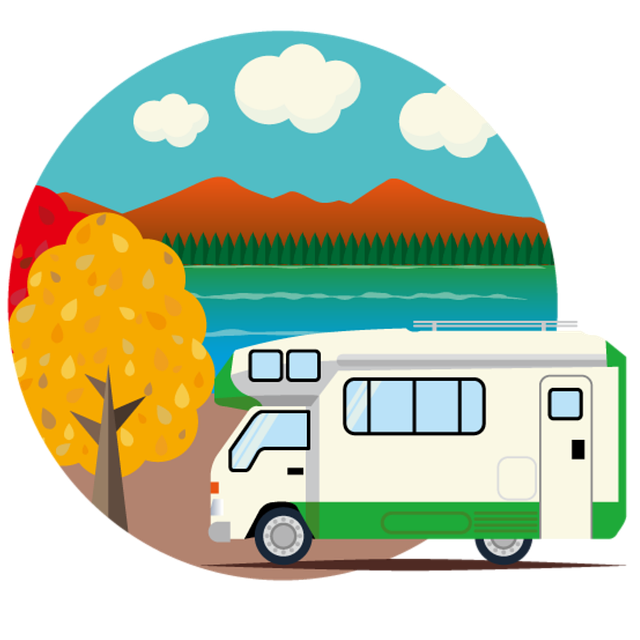
For those embarking on their first RV journey, meal planning and kitchen adaptation become crucial for maintaining comfort and convenience while on the move. RV travel tips often highlight the importance of understanding the capabilities and limitations of your RV’s kitchen. Unlike a traditional home kitchen, space is at a premium, and appliances may differ. To maximize storage, invest in stackable or collapsible containers that save space while keeping ingredients fresh and organized. Utilize the RV’s built-in features to your advantage; for instance, many RV ovens have limited space but can still accommodate small pans or foil-wrapped dishes. Plan meals around these constraints, opting for one-pot wonders or recipes that require minimal utensils and pots, which are easier to clean in the confined space of an RV sink.
When it comes to meal planning, consider the length of your trip and the availability of grocery stores en route. Stock up on non-perishables and staples that won’t spoil, and choose recipes that can be easily prepared or reheated. RV travel tips recommend incorporating versatile ingredients that can be used in various dishes throughout your travels. Embrace the opportunity to try new cuisines by picking up local produce and spices at each stop, infusing your meals with regional flavors. Additionally, familiarize yourself with the RV’s propane system, electrical outlets, and water and waste tank management to avoid any surprises during meal preparation. By planning ahead and making efficient use of your RV’s kitchen, you can enjoy delicious, home-cooked meals anywhere your travels take you.
Financial Considerations and Budgeting for Long-Term Travel in an RV
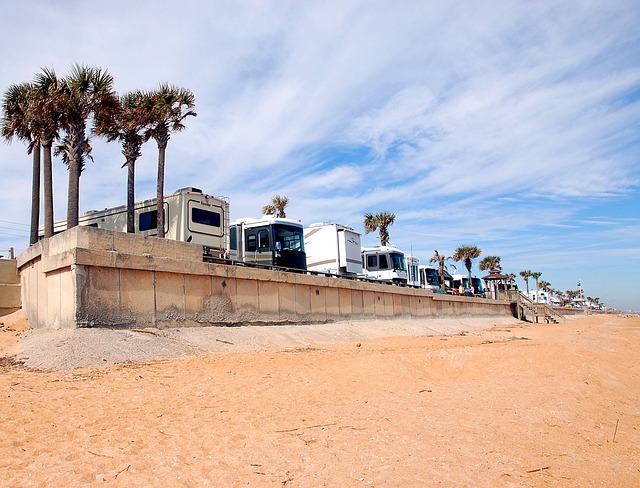
When planning long-term travel in an RV, budgeting is a crucial aspect that requires careful consideration. Firstly, potential RV travelers should assess their financial situation to determine what they can realistically afford. This includes not only the upfront cost of purchasing or renting an RV but also the ongoing expenses such as fuel, maintenance, and campground fees. It’s advisable to create a detailed budget that accounts for all potential costs, including unexpected repairs or varying living expenses in different regions. To manage these financial considerations effectively, travelers can utilize RV Travel Tips found in various online resources and forums. These tips often emphasize the importance of setting a daily budget for travel-related expenses and establishing an emergency fund to cover unforeseen costs. Additionally, travelers should explore cost-saving measures like membership programs at campgrounds, which can provide discounts, and using fuel-efficient RV models to minimize energy consumption and reduce overall travel costs. Keeping a detailed log of daily spending helps in tracking where funds are going and identifying areas for potential savings, ensuring that the journey remains financially sustainable over the long term.
Embarking on your first RV journey can be as exhilarating as it is daunting, but with the right resources and knowledge, navigating the open road becomes an adventure of a lifetime. This article has equipped you with essential RV travel tips, from grasping the lingo to selecting the perfect RV for your adventures, understanding maintenance, and securing campground spots. You’re now well-versed in meal planning within your new mobile kitchen and have a grasp on the financial aspects to ensure long-term travel remains feasible. Armed with these insights, you’re ready to hit the road with confidence. Safe travels and happy exploring!
